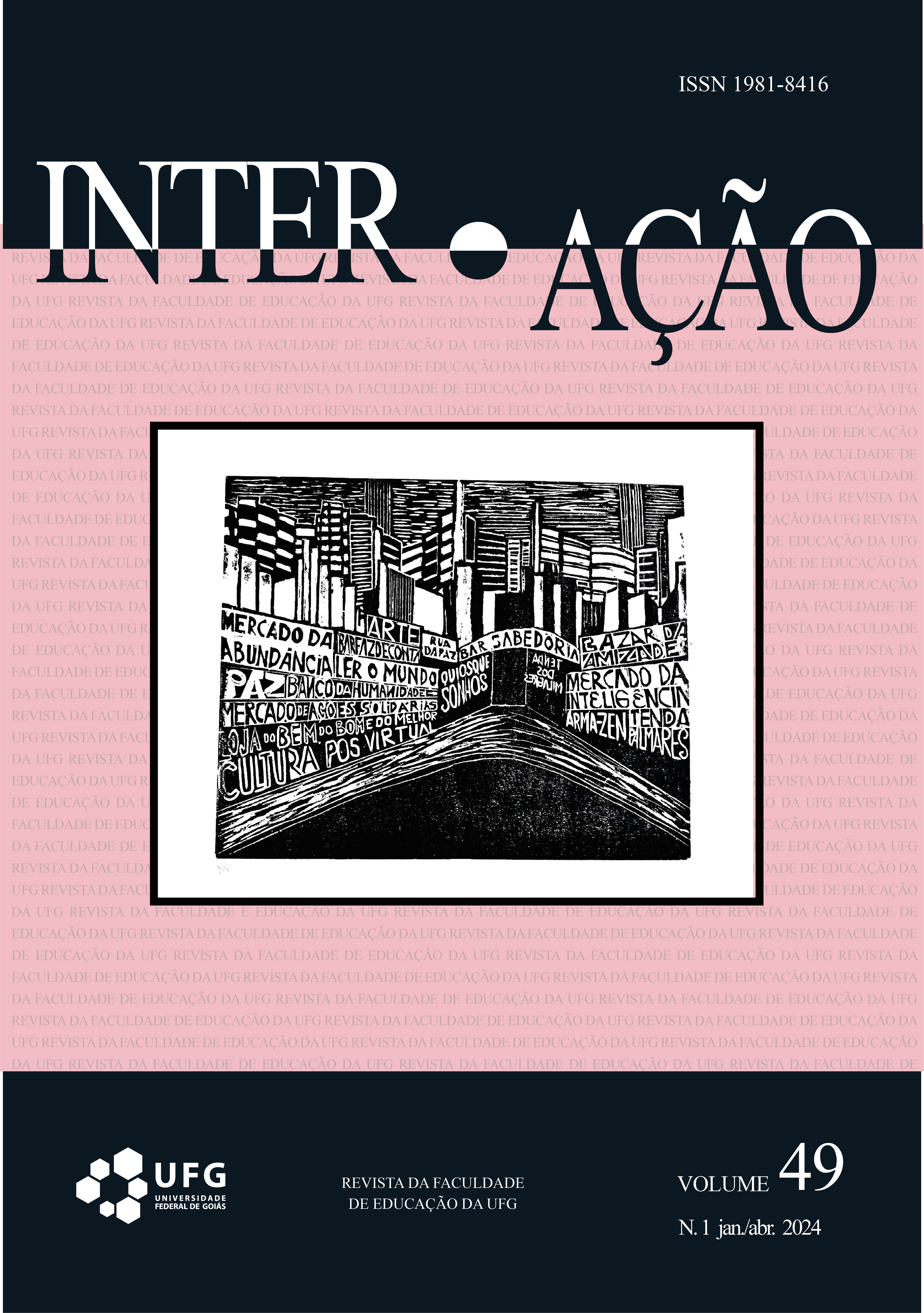BRAZILIAN EDUCATION IN THE CONTEMPORARY WORLD AS A UNIVERSAL RIGHT, FROM A MEETING BETWEEN PAULO FREIRE, ZYGMUNT BAUMAN AND JOSÉ MORAN
DOI:
https://doi.org/10.5216/ia.v49i1.75885Keywords:
Brazilian Education; Liquid Modernity; Technology; Universal Law.Abstract
Education is a universal right and, as such, needs to be respected, monitored and, commonly, evaluated as a premise of equity in access and permanence in school. That said, this article aims to consider the postulates of Paulo Freire, Zygmunt Bauman and José Moran, aiming to match their possible reflections on the current challenges of education, as a universal right. Thus, based on qualitative principles, we developed a bibliographical research, whose main information was collected from the works of these authors. We consider the context of a fluid space-time and the cradle of a society with undeniable technological realities, which allow obtaining information and opportunities for the world of work and which demand the reinvention and humanization of the classroom, to think about the utopia of the universal right to education of quality.
Downloads
References
BAUMAN, Zygmunt. Modernidade Líquida. Rio de Janeiro: Zahar, 2001.
BAUMAN, Zygmunt. Tempos Líquidos. Rio de Janeiro: Zahar, 2007.
BAUMAN, Zygmunt; LEONCINI, Thomas. Nascidos em tempos líquidos. Rio de Janeiro: Zahar, 2018.
BRASIL. [Constituição (1988)]. Constituição da República Federativa do Brasil de 1988. Brasília, DF: Presidência da República, [2021] Disponível em: http://www.planalto.gov.br/ccivil_03/Constituicao/Constituicao.htm. Acesso em: 12 jun. 2021.
FREIRE, Paulo. Educação como prática de liberdade. Rio de Janeiro: Paz e Terra, 1994.
FREIRE, Paulo. Educação e mudança. Rio de Janeiro: Paz e Terra, 1979.
FREIRE, Paulo. Pedagogia da autonomia. Rio de Janeiro: Paz e Terra, 2020.
FREIRE, Paulo. Pedagogia do oprimido. Rio de Janeiro: Paz e Terra, 1987.
GARCIA, Regina Leite; ESTEBAN, Maria Teresa; SERPA, Andrea. (Org.). Saberes cotidianos em diálogo. Petrópolis: DP et Alii, 2015.
GIL, Antonio Carlos. Métodos e técnicas de pesquisa social. 4ª ed. São Paulo, SP: Atlas, 2008.
LEITE, Francisco Tarciso. Metodologia científica: métodos e técnicas de pesquisa. Aparecida-SP: Ideias & Letras, 2008.
MINAYO, Maria Cecília de Souza (Org.); DESLANDES, Suely Ferreira; GOMES, Romeu. Pesquisa Social: Teoria, método e criatividade. Série Manuais Acadêmicos. Petrópolis, RJ: Vozes, 2016.
MORAN, José. Autonomia e colaboração em um mundo digital. Revista Educatrix, [s. l.] n. 7, 2014. Editora Moderna, p. 52-37. 2014b. Disponível em: http://www2.eca.usp.br/moran/wp-content/uploads/2013/12/autonomia.pdf. Acesso em: 20 jun. 2021.
MORAN, José. Mudanças necessárias na educação, hoje. 2014a. Disponível em: http://www2.eca.usp.br/moran/wp-content/uploads/2013/12/mudan%C3%A7as.pdf. Acesso em: 19 jun. 2021.
MORAN, José. Metodologias ativas para uma aprendizagem mais profunda. In: BACICH, Lilian; MORAN, José (Org.). Metodologias ativas para uma educação inovadora: uma abordagem teórico-prática. Porto Alegre: Penso, 2018. p. 02-25.
MORAN, José. Educação Híbrida: Um conceito-chave para a educação, hoje. In: BACICH, L.; NETO, A. T.; TREVISANI, F. DE M. (Org.). Ensino Híbrido: personalização e tecnologia na educação. Porto Alegre, RS: Penso, 2015, p. 27-45.
ONU. Organização das Nações Unidas. Declaração Universal dos Direitos Humanos. 1948. Disponível em: https://unesdoc.unesco.org/ark:/48223/pf0000139423?posInSet=1&queryId=b8fa9953-ff03-4a6b-94aa-aad90ec2657d. Acesso em: 12 jun. 2021.
SILVEIRA, Denise Tolfo; CÓRDOVA, Fernanda Peixoto. A Pesquisa Científica. In: GERHARDT, Tatiana Engel; SILVEIRA, Denise Tolfo. Métodos de pesquisa. Universidade Aberta do Brasil (UAB/UFRGS). Curso de Graduação Tecnológica – Planejamento e Gestão para o Desenvolvimento Rural (SEAD/UFRGS). Porto Alegre: Editora da UFRGS, 2009.
UNESCO. Organização das Nações Unidas para a Educação, a Ciência e a Cultura. Declaração Mundial sobre Educação para Todos: satisfação das necessidades básicas de aprendizagem. 1990. Disponível em: https://unesdoc.unesco.org/ark:/48223/pf0000086291_por. Acesso em: 12 jun. 2021.
VALENTE, José Armando. Mudanças na sociedade, mudanças na Educação: o fazer e o compreender. In: VALENTE, José Armando et al. (Org.). O computador na sociedade do conhecimento. Coleção Informática para a Mudança na Educação. Ministério da Educação. Campinas: Unicamp/NIED, v. 6, 1999, p. 31-44.
Published
How to Cite
Issue
Section
License
Copyright (c) 2024 Erica Rezende Perini, Fernanda Cardoso de Menezes Bahia, Ana Carolina Carius

This work is licensed under a Creative Commons Attribution-NonCommercial 4.0 International License.
Inter-Ação uses the Creative Commons Attribution 4.0 License for Open Access Journals (Open Archives Initiative - OAI) as the basis for the transfer of rights. Open access means making documents available on the Internet free of charge, so that users can read, download, copy, distribute, print, search, or link to the full text of documents, process them for indexing, use them as input data for software programs, or use them for any other lawful purpose, without financial, legal, or technical barriers.
Authors publishing in this journal agree to the following conditions:
1) Authors retain copyright and grant the journal the right of first publication, with the work simultaneously licensed under the Creative Commons Attribution License, which permits redistribution of the work with attribution and first publication in this journal.
2) Authors are permitted to enter into additional, separate agreements for non-exclusive distribution of the version of the work published in this journal (e.g., for publication in an institutional repository or as a book chapter), with attribution and first publication in this journal.
3) Authors are permitted and encouraged to publish and distribute their work online (e.g. in institutional repositories or on their home page) at any time before or during the editorial process, as this may generate productive changes as well as increase the impact and citation of the published work.















